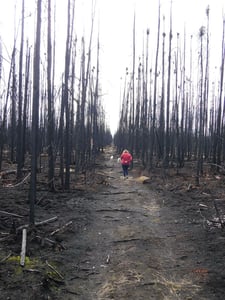 PALMER, Alaska (CN) — Jurors began deliberations Thursday on the guilt of two Alaskans accused of starting the June 2015 fire that ripped through the community of Willow and burned thousands of acres of forest, destroying more than 55 homes and killing pets, sled dogs and wildlife.
PALMER, Alaska (CN) — Jurors began deliberations Thursday on the guilt of two Alaskans accused of starting the June 2015 fire that ripped through the community of Willow and burned thousands of acres of forest, destroying more than 55 homes and killing pets, sled dogs and wildlife.
Anchorage residents Greg Imig, 61, and Amy DeWitt, 43, are accused of 12 criminal misdemeanor charges, including reckless endangerment, criminally negligent burning, leaving a fire unattended with damage to property, and burning without a permit, for allowing a fire from one of three burn piles on Imig’s property to get out of control.
Willow, about two hours north of Anchorage, is a major hub for dog mushers and their kennels, and home to the start of the Iditarod Trail Sled Dog Race. Others, including Imig, own secondary property there for recreation away from the city.
The Sockeye Fire – named for Sockeye Road, where the fire began on a dry 80-degree day nearly two years ago – cost more than $8 million to fight, and millions more in material losses.
If they’re found guilty Imig and DeWitt would be required to pay double that dollar amount in damages and firefighting costs.
In closing arguments on Wednesday, Assistant District Attorney Eric Senta spent about 90 minutes recapping testimony from more than a dozen witnesses and experts that took the stand for the state over the course of 12 days.
He also pointed out inconsistencies in the testimonies of both defendants and maintained that wildfire investigators gathered enough information to prove their guilt beyond a reasonable doubt.
“Ladies and gentlemen, I said in my opening statement that this case was going to be about the defendants’ recklessness in causing the Sockeye Fire and the human and property cost of that recklessness, and that has borne out in the last few weeks,” Senta said to the jury.
He added, “This fire crept out from that fire pit, building in intensity, then it hits one single tree and it goes up, and from there it goes south. That’s what their conclusion is, that’s what the defendants say happened. That I submit to you solves the case.”
Each of the defendants’ attorneys took their full 90 minutes to reiterate to the jury that in order to convict, they have to be certain that the evidence is really there and that their privately hired investigators found the state’s investigation “sloppy and biased.”
“Regardless of the number of charges that you file, if the evidence isn’t there then the defendants are not guilty,” DeWitt’s attorney Philip Shanahan said.
Imig’s attorney Kevin Fitzgerald told the jury, “The explanation, the hypothesis described by the state is inconsistent with common sense, it’s inconsistent with the science behind wild land fire investigation and it’s inconsistent with the other evidence.”
During the trial, Willow fire officials, some of whom lost their own homes while fighting the fire and helping neighbors evacuate, along with several business and homeowners including veteran Iditarod mushers, provided at times tearful testimony of the panic of evacuating quickly and losing all they owned.
DeWitt took the stand for three hours on Monday, giving an emotional testimony in her own defense about the day of the fire. She maintained that it could not have been the smallest of the three burn pits that state investigators claim started the forest fire.
"I don't think anybody can be 100 percent sure of anything," DeWitt testified. "It was the coldest, smallest pit. These other two were larger fires and longer burning and it never made sense to me. It was a cold fire Sunday afternoon."
During cross-examination, DeWitt admitted that she had not used any tools to verify the fires were actually out.
Senta reminded the jury in his closing recap that when the fire got out of control, witnesses testified that Imig and DeWitt made little effort to put it out or warn neighbors, other than calling 911, and then fled in their motor home.
In her defense, DeWitt said “it was scary as hell.”
"Every one of us went through the same thing,” she said, referring to panic and the need to leave the area.
However, Senta reminded the jury about immediate neighbors of the couple and local fire personnel who testified about grabbing what they could of their own valuables, before returning, alerting neighbors and helping evacuate them and their animals as the fire quickly spread.
DeWitt’s attorney asked that she be found not guilty, while Imig’s attorney maintained that the fire started 50 yards ahead of his client’s property and the only charge that evidence supports is burning without a permit.
Ten jurors will decide the criminal fate of Imig and DeWitt. The couple could also face more time in court as fire victims, many who testified at or observed the criminal trial, may file civil lawsuits for damages.
Subscribe to Closing Arguments
Sign up for new weekly newsletter Closing Arguments to get the latest about ongoing trials, major litigation and hot cases and rulings in courthouses around the U.S. and the world.









